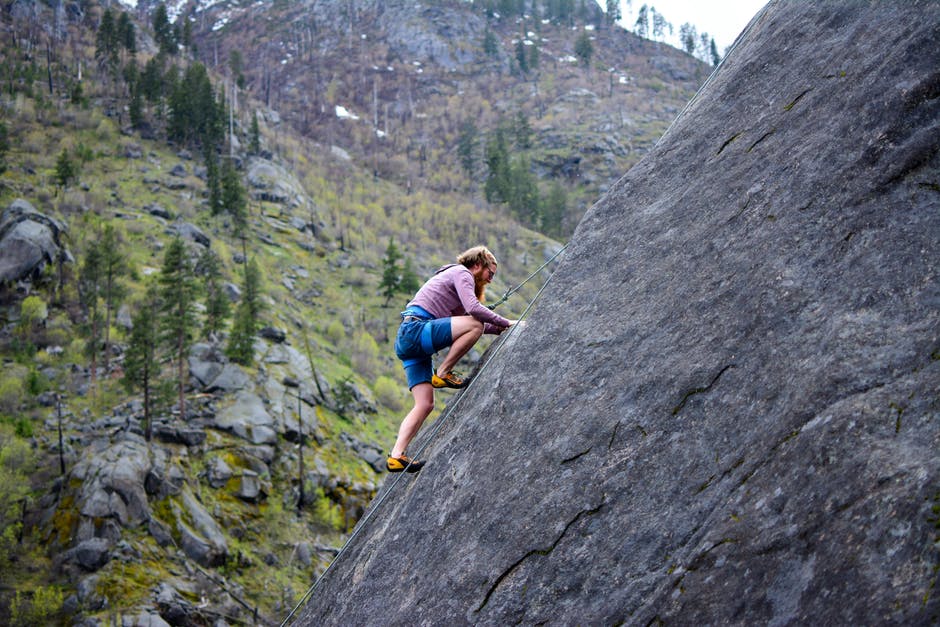How to speak like a rock climber

Have you ever hung out with your rock climbing buddies and felt everything they say is completely lost in translation? If you want to fit in with the crew, you’d better learn some rock climber’s jargon as soon as possible. Climbers use a lot of different terms to describe their sport, the weather conditions, the gear, and their projects. Sometimes it’s hard to keep up with them if you have no idea what the words they use mean.
To learn to speak as a rock climber, first you need to build a database of terms. Then start using them as much as you can. Hang out with climbers, try to pick up new words from veteran climbers, and show that you’re willing to learn. Here’s a list of the basic rock climbing terms, some of them are very general but are all used by climbers.
ROCK CLIMBING TERMS
Abseil – See Rappel. A word used by climbers from Europe and Australia.
Aid climbing – Climbing a wall by pulling on pieces of gear rather than climbing under your own weight.
Anchor – A point where the rope gets attached.

Ape index – The distance from fingertip to fingertip with arms outstretched.
Approach – The hike required to reach your climbing spot.
Arête – Two rocks that lay across to make an outside corner.
Back clip – An error made by the lead climber where he threads the rope in the quickdraw backward, which increases the chances of the quickdraw to unclip and cause falling.
Back up – Refers to anything that has a back up in place, like for example two anchor points.
Bare down – To hold and pull on a crimp.
Beached whale – Belly-first top outs that involve a lot of thrutching.
Beta – Instruction on how to do climbing.
Belayer – The person who handles the rope through a belay device on the ground when their partner is climbing.
Beta map – A piece of paper where the boulder problem is sketched.
Biff – An unexpected fall from anywhere on a climb.
Big Wall – A long route that takes multiple days to climb.
Bight – A small fold on a climbing rope.
Camming – When a body part or a gear rotates in one place.
Crimp – A small hold or edge.

Crozzly – Uncomfortable hold.
Crux – The hardest problems on the route.
Deck – A ground fall of the lead climber.
Dihedral – Two rocks that lay across to make an inside corner.
Dirt me – When you ask your belayer to lower you on the ground.
Elvis Leg – When a climber is nervous, and one leg begins to shake without control.
Flash – To climb a route or a boulder with no falls on your first try.
Free soloing – Climbing routes without any equipment or ropes.
Gumby – A new climber who has no idea what they’re doing.
Hueco – A large hole in the wall.
High ball – A very tall boulder problem.

Have it – This phrase is used to encourage climbers to try harder.
Jug – A hold that can be grabbed with the entire hand.
Manky – Wet holds or parts of the route.
Nails – A term used to describe something that’s very hard.
Pebble wrestling – Bouldering.
Pocket – Round hole in the wall where you can place few fingers but not the whole hand.
Positive – A very good hold.
Rack – The protective gear that a climber uses.
Rappel – A method used to descend a rope.
Redpoint – To climb a route or boulder with no falls after having tried it at least once before.
Roof – An overhanging rock that needs a horizontal approach.
Smedge – Smear edge.
Tips – Fingertips.
Wired – Well memorized and practiced beta and moves.
Start learning this vocabulary if you have any serious intentions on learning a new sport. You will be accepted in the climbing community easier if you speak their language. Good luck!
If you have any comments then please drop us a message on our Outdoor Revival Facebook page
If you have a good story to tell or blog let us know about it on our FB page, we’re also happy for article or review submissions, we’d love to hear from you.
We live in a beautiful world, get out there and enjoy it. Outdoor Revival – Reconnecting us all with the Outdoors.
